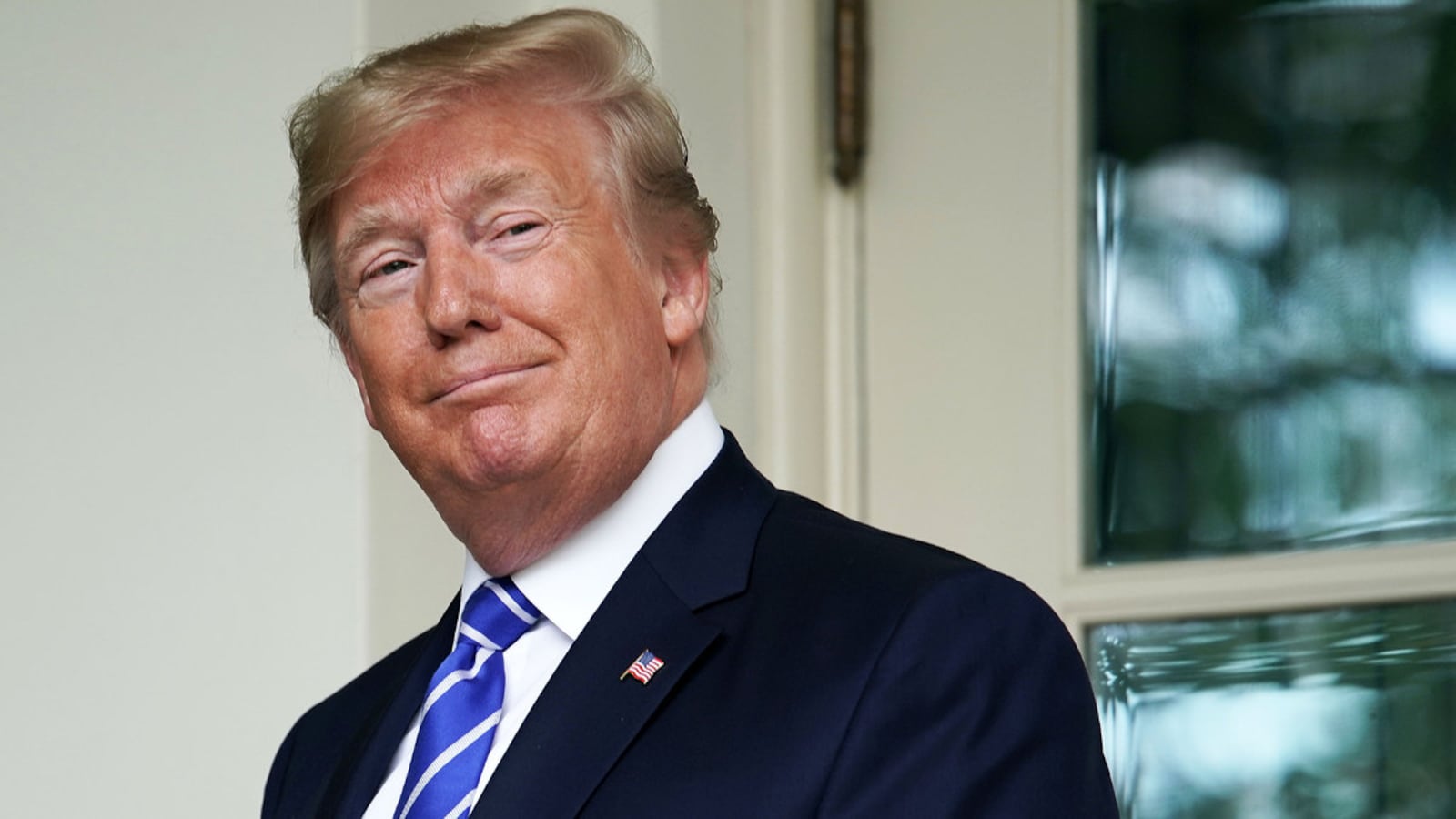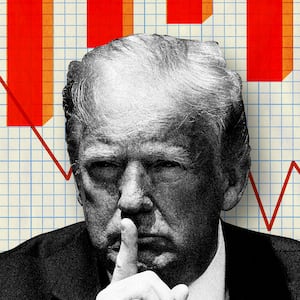As Donald Trump returns to the campaign trail this Saturday night in Tulsa, Oklahoma, some of his top political advisers are growing increasingly concerned that the president won’t be able to dig himself out of the hole he’s made for himself.
Over the past two weeks, several of the president’s campaign lieutenants as well as individuals in his administration have reacted with mounting alarm as multiple polls have shown Trump dipping into the 30s against former Vice President Joe Biden, the presumptive 2020 Democratic presidential nominee. In weeks past, various aides in the White House and on the Trump re-election effort had privately expressed cold comfort in the fact that with everything going on—a bungled response to a deadly pandemic, a massively crippled U.S. economy, protests across the nation, and a number of Trump’s own former top officials coming out against him—it was practically a miracle that the president’s poll numbers hadn’t sunk even lower.
Early this month, one senior White House official told The Daily Beast that their “nightmare scenario” would be for the president to slip beneath 40 percent support in a sustained string of public and private surveys—thus signaling that a previously unshakable base was starting to grow a bit disillusioned. Trump’s consistent—though perhaps unenviable—standing in the low 40s had for years remained an illustration of his enduring base and iron Republican support.
“Until then, I’m not a doomsayer,” this official said, referring to the nerve-racking 30s in national, and some state, polling.
In the time since that comment, multiple polls have shown Trump sliding into the 30s. Asked this week about the change, the same White House official simply responded, “This is not where any of us wanted to be at this point [in the election], but there is still time… to make up the difference.”
Some advisers lay the blame for recent poll numbers squarely at the weeks-long news coverage of the mass protests against institutional racism and police brutality following the killing of George Floyd, and how Trump has responded to it. “When race is in the news cycle and dominating the conversation, President Trump’s numbers always go down,” said a source close to the White House. “That’s just a fact.”
The source added that they hoped coverage of former National Security Adviser John Bolton’s tell-all book about Trump would actually lead to a poll bump for the president, if for no other reason than it would mean less talk of racism, COVID, and social unrest.
But Trump has had a knack for getting in the way of even the most well-crafted media plans, to say nothing of the ones his advisers hope play out. Even the announcement of the Tulsa rally was fraught with hiccups and missteps. His team had previously scheduled it for Friday, which meant it would have fallen on Juneteenth in a city that was the site of one of the country’s most savage massacres of Black people. Following a backlash, the president announced the date switch to Saturday. He subsequently claimed that he had made Juneteenth—which has long commemorated the end of slavery in the United States—“very famous” because “nobody had ever heard of it.” His White House press secretary, Kayleigh McEnany, defended those remarks on Friday by noting a spike in Google searches.
Trump has also attempted to portray the economic damage caused by the pandemic as fleeting. But Republican operatives have expressed concern that his talk of a rocket ship recovery may effectively portray him as out of touch to voters who still feel left behind. And even his own team is uncertain about whether it’s an effective campaign play. Two of the four aforementioned officials told The Daily Beast that they were unnerved by the fact that they’d seen no polling evidence, in internal data or in multiple different public polls, that the news of higher retail sales and the addition of 2.5 million jobs in May had given the president the bump they had wanted and expected.
“If the next [unemployment] reports get better and better, hopefully you’ll see a change then and noticeable impact,” one of these officials said, adding that right now far too many people are out of work and “hurting.”
Hoping to give himself an additional boost on the economic front, Trump has continuously expressed a desire for additional, big-ticket federal stimulus—which some Republican officials believe would improve his chances. Top Democrats on the Hill, however, say they have not yet had any formal discussions with Treasury Secretary Steven Mnuchin about such a package (House Democrats have passed one of their own) and there is wide antipathy among aides about working with the White House unless it provides more insight into how it is spending the hundreds of billions of dollars that was already appropriated.
“It is a top priority,” a senior House Democratic aide said of getting answers on where the Treasury Department’s funds have gone.
Senate Republicans, meanwhile, have put off talk of another bill entirely. And even among Trump’s cadre of advisers, there is not much appetite for another stimulus bill.
“The economic damage done by the coronavirus is a lot less than what was predicted months ago… It’s awful, but it’s much better in states like California, Texas, and Florida than what experts thought it would be,” said Art Laffer, the notoriously conservative economist who informally advises Trump. “People are even hedging their bets on if there’s going to be a second wave of the virus… The stock market is telling us this ain’t going to be a big deal. It’s nothing compared to Y2K or 2008… Those were really big downs in the market, and this is nothing compared to that. It started off really big, with a big drop… but then it came right back. That’s not the way it went in 2008 and 2009.”
Absent a major economic measure or turnaround, Trump’s options for reversing his polling slide are slimmer. In an interview with Politico that was published on Friday, the president did express a degree of worry about his chances against Biden. But he couched his concern in baseless theories about the potential for rampant voter fraud in mail-in ballots. “My biggest risk is that we don’t win lawsuits [regarding mail-in voting],” the president said. “We have many lawsuits going all over. And if we don’t win those lawsuits, I think—I think it puts the election at risk.”
Increasingly, Trump seems content to try and re-run the playbook he used in 2016 in hopes that it works again. Elsewhere in that Politico interview, he warned other Republican candidates—including those running to help preserve the party’s Senate majority—not to tiptoe away from him, no matter what his poll numbers look like. And in recent days his team has made another aggressive effort to troll Biden (much as they did Hillary Clinton) as physically and mentally unwell. The president has brought back top aides from his last presidential run and is turning to one of his most prominent surrogates from that race to help, as well.
On Thursday, Politico reported that the Trump campaign had enlisted former New York City mayor Rudy Giuliani—who as Trump’s personal lawyer launched a dirt-digging expedition into the Bidens that led directly to the president’s impeachment—to “spearhead a campaign to press for more debates this fall, starting earlier than usual and to have a say in choosing the moderators,” so that Trump can have more opportunities to publicly humiliate Biden, someone who the president seems convinced will crack under a one-on-one grilling.
Asked on Thursday if he now has an official title on Trump 2020, Giuliani told The Daily Beast, “No sir I am just helping out.”








